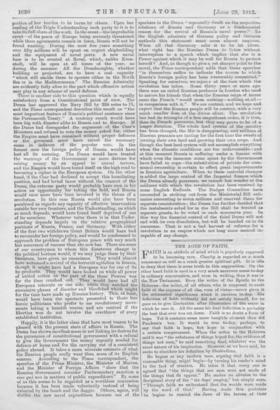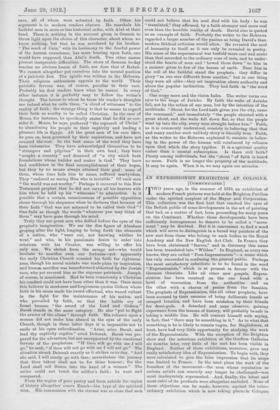THE AGES OF FAITH.
He begins as any modern man, arguing that faith is reasonable thing, might begin—by turning his reader's mind to the fact of creation. He takes it that every one is agreed that "the things that are seen were not made of the things that do appear." He makes no allusion to the Scriptural story of the "six days' employ," but simply says,
"Through faith we understand that the worlds were made by the word of God." Having made this postulate he begins to remind the Jews of the heroes of their race, all of whom were actuated by faith. Often his argument is to modern readers obscure. He marshals his faithful men in more or less historical order, with Abel at their head. There is nothing in the account given in Genesis to throw light upon the choice of this character, about whom we know nothing, but that he was murdered by his brother. "The mark of Cain," with its testimony to the fearful power of the human conscience, has more bearing upon faith, one would have supposed, than Abel's death. Two other names present insuperable difficulties. The story of Samson to-day teaches no obvious lesson of faith, nor does that of Rehab. We cannot altogether put ourselves into the mental position of a patriotic Jew. The epistle was written to the Hebrews. Their religious enthusiasm appeals to the world. Their patriotic fervour was, of course, peculiar to their race. Probably his first readers knew what he meant. In every other instance it is perfectly easy to follow the writer's thought. The heroes to whom he turns his reader's thoughts are indeed what be calls them, "a cloud of witnesses" to the reality of faith ; the strange thing is that he seems to regard their faith as worthy to be called Christian. In the ease of Moses, for instance, he specifically states that he did so con- sider it. Moses, he says, preferred "the reproach of Christ" to abandoning his people in their captivity and leading a pleasant life in Egypt. All the great men of his race have, he goes on, been governed by their aspirations, and have not counted the cost. In the beat sense of the word they have been visionaries. They have acknowledged themselves to be "strangers and pilgrims" in their own land ; they have "sought a country" and dreamed of "a city which bath foundations whose builder and maker is God." They have had confidence in the final accomplishment of their hopes, but they by no means always attained their goal : some of them, whom time fails him to name, suffered martyrdom. They "endured as seeing Him who is invisible." Of such men "the world was not worthy." Perhaps it occurred to this New Testament prophet that he did not carry all his hearers with him when he held up his " witnesses " to admiration. Is it possible that a certain consciousness of possible opposition shone through his eloquence when he declares that because of their faith "God was not ashamed to be called their God " P One feels as though the words "whatever you may think of them" may have gone through his mind.
Truly they are great men who defiled before the eyes of the prophet's imagination. We see the dim figure of Abraham groping after the light, longing to bring forth the elements of a nation, who "went out, not knowing whither he went," and who, in his passionate desire to enter into relations with his Creator, was willing to offer his only son. We shrink from the savage act—who would hesitate to sacrifice even our fortunes—yet apparently the early Christian Church counted his faith for righteous- ness, though his moral mistake was made plain by inspiration, and human sacrifice was henceforward abhorred by the Jewish race, who yet revered him as the supreme patriarch. Joseph, of course, is mentioned. Had he been consciously a Christian his conduct could not have been other than it was. Once more this believer in meekness and forgiveness quotes Gideon whose faith in his cause made his sword .effectual, who waxed valiant in the fight for the maintenance of his nation, and who prevailed by faith, so that the battle cry of Israel became "the sword of the Lord and Gideon." Barak stands in the same category. He also "put to flight the armies of the aliens" through faith. His reliance upon a woman did not make him absurd in the eyes of the early Church, though in these latter days it is impossible not to smile at his open subordination. "Arise, arise, Barak, and lead thy captivity captive" cried Deborah. Barak was pre- pared for the adventure, but not unsupported by the emotional fervour of the prophetess. "If thou wilt go with me I will go," he said; "if thou wilt not go with me I will not go." The situation struck Deborah exactly as it strikes us to-day. "And she said, I will surely go with thee ; nevertheless the journey that thou takest shall not be for thine honour ; for the Lord shall sell Sisera into the hand of a woman." The satire could not touch the soldier's faith ; he went and conquered.
From the region of pure poetry and from outside the region of history altogether comes Enoch—the type of the spiritual man, His communion with the eternal was so close that men could not believe that his soul died with his body : he was "translated," they affirmed, by a faith stronger and more real even than the horrible reality of death. David also is quoted as an example of faith. Probably the writer to the Hebrews regarded a larger number of the psalms as being David's than modern Biblical criticism would allow. He revealed the soul of humanity to itself as it can only be revealed in poetry. His sense of the supernatural was tenfold more real and acute than that accorded to the ordinary sons of men, and he under. stood the hearts of men and "bowed them down" to him in a manner given to few of the heroes of earth. Near him in the roll of the faithful stand the prophets : they differ in glory "as one star differeth from another," but in one thing • they were all alike—they set inspiration above authority and above the popular inclination. They had faith in "the word of God."
One scene more and the vision fades. The writer turns our eyes to the—siege of Jericho. By faith the walls of Jericho fell, not by the action of one man, but by the intention of the multitude. "Shout, for the Lord bath given you the city, came the command," and immediately "the people shouted with a great shout, and the walls fell down fiat, so that the people went up into the city, every man straight before him." Faith, as it is commonly understood, consists in believing that that and many another such unlikely story is literally true. Faith, as the writer to the Hebrews explained it, consists in believ-
ing in the power of the human will reinforced by reliance upon God which the story typifies. It is a spiritual quality rather than a mental subscription. Is there still faith? Plenty among individuals, but the "shout" of faith is heard no more. Faith is no longer the property of the multitude. It may be again. When it is, we may again see miracles.























































 Previous page
Previous page